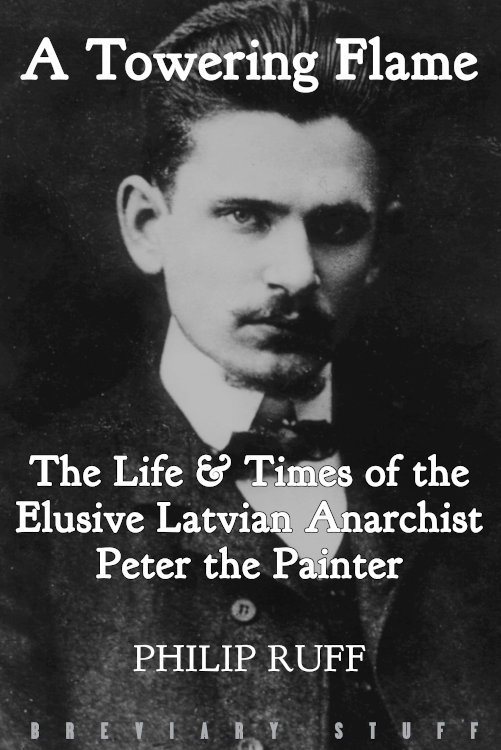- Introduction to the English Edition by Mike Collier
- Introduction to the Latvian Edition by Philip Ruff
- Principal Characters
- Preface: My Search for Peter the Painter
- Prologue: The Houndsditch Murders. Dramatic reconstruction
- 1. 1883 to January 1905: A Painter and Artist, or Dauber
- 2. January to September 1905: The Times of the Land Surveyor
- 3. October to December 1905: A Rough School
- 4. January to March 1906: Dare to be a Daniel
- 5. April to December 1906: The Same, in Word and Deed
- 6. 1907 to 1909: Broken Pines
- 7. 1897 to 1908: Foreigners, Anarchists and Vegetarians
- 8. January to October 1909: Alien Robbers Run Amok
- 9. October 1909 to December 1910: The Flame
- 10. January 1911 to December 1912: Retribution
- 11. 1911 to 1917: Life After Sidney Street
- 12. 1917 to 1939: No Time for Dreams
- 13. 1912 to 2012: The Man who was Away
- Index
Special Price
Philip Ruff – A Towering Flame
The Life & Times of the Elusive Latvian Anarchist Peter the Painter£17.00 / £22.50
The Houndsditch murders of three City of London policemen in 1910 and the ensuing “Siege of Sidney Street”, in which Latvian anarchists took on Winston Churchill and the British Army, have entered into East London folklore. But no-one ever accounted for the mysterious Peter the Painter, popularly supposed to be the leader of the gang and to have escaped the burning house during the battle. This book solves the mystery. Here for the first time is proof of the real identity of Peter the Painter; the amazing story of his life and revolutionary career; and of the hitherto unknown history of Latvian anarchism. The violent events in London are revealed to be part of a much bigger story which lay behind them — the 1905 revolution in the Baltic and the armed resistance to Russian state terrorism which followed it. This is a story of class war, revolution and survival; and of a small nation striving to assert its identity; a story that, in the context of a resurgence of Russian imperial ambition aimed at the Baltic states, has particular resonance today.
'A unique and historical work on the Revolution of 1905 and Latvian anarchists… If I were president, then I’d make this book compulsory reading.' Andris Vitoliņŝ, Arterritory.com
'Ruff’s historical research is written in the best traditions of academic writing … the fast-moving and compact way of story-telling, which is more characteristic of the detective genre, seems to be effortlessly natural… One of us [a Latvian] should take care that this wonderful story gets a sequel.' Viktors Dāboliņŝ, Latvju Teksti
'Like a master of popular “puzzles”, in the course of many years the author found and identified the scattered and before now partly hidden fragments, and put them together in an easily comprehensible, unified picture, in which countless people and events are interconnected, and where everything acquires meaning… a quiet, convincing story, richly supported by historical facts.' Maira Asare, Kultūres Diena
'Just finished your Towering Flame. Thank you for the compassionate, sobering account. Enjoyed it very much… well researched, well written, candid… I have shared this book and suggested reading it to many — excellent work!!' Lolita Čigāne, Member of Parliament of the Latvian Republic
'British historian Philip Ruff’s decades-long researches have cast new light on a fascinating period in both Latvian and British history.' Mike Collier, Chief Editor, Latvian Public Media English Service
'In telling the story of Jānis Žāklis, the 1905 revolution in Latvia, and the anarchist movement it spawned, Ruff avoids the traps of simplistic celebration or condemnation — a marvellous work of historical rediscovery.' John Patten, Kate Sharpley Library




